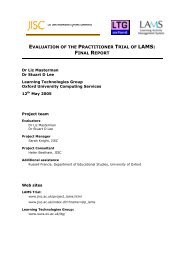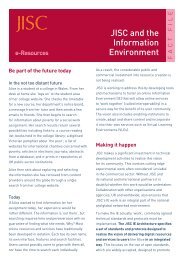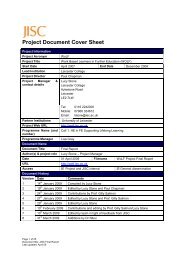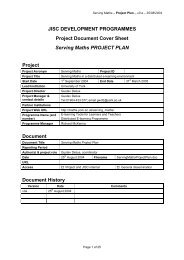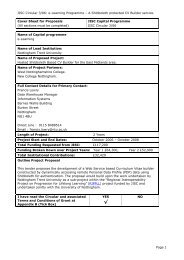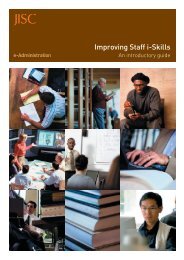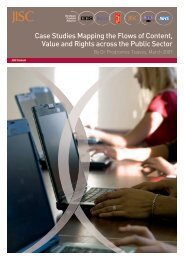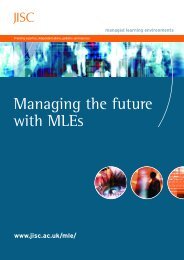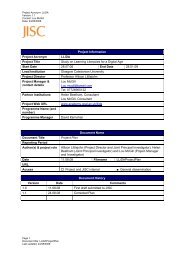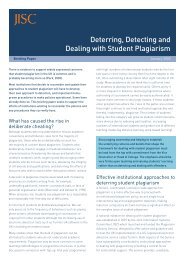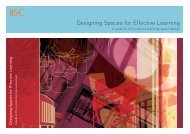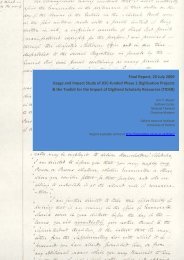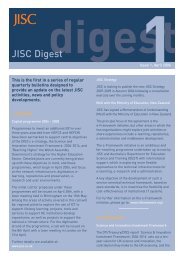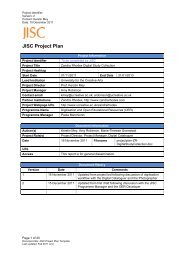Transforming Curriculum Delivery through Technology - Jisc
Transforming Curriculum Delivery through Technology - Jisc
Transforming Curriculum Delivery through Technology - Jisc
Create successful ePaper yourself
Turn your PDF publications into a flip-book with our unique Google optimized e-Paper software.
<strong>Transforming</strong> <strong>Curriculum</strong> <strong>Delivery</strong> <strong>through</strong><br />
<strong>Technology</strong><br />
Lisa Gray, JISC e-Learning Programme<br />
Joint Information Systems Committee<br />
Supporting education 6/25/2008 and | research | Slide 1
• Circular 08/08<br />
– Introduction (paragraphs 1-12)<br />
Joint Information Systems Committee<br />
Key documents<br />
– Call 1: <strong>Transforming</strong> <strong>Curriculum</strong> <strong>Delivery</strong> Through <strong>Technology</strong><br />
(paragraphs 13 – 48)<br />
– General information related to all projects (paragraphs 102 – 136)<br />
– Appendices A, B, C and D<br />
• Briefing paper<br />
• Differences between this call and the <strong>Curriculum</strong> Design call<br />
(05/08)<br />
• All available from:<br />
www.jisc.ac.uk/fundingopportunities/funding_calls/2008/06/ci<br />
rcular808.aspx
• HE institutions funded via HEFCE and HEFCW<br />
Who can bid?<br />
• FE institutions that teach HE to more than 400 FTEs,<br />
provided proposals demonstrate how the work supports HE<br />
provision<br />
• FE institutions (including those with fewer than 400 FTEs)<br />
may bid against funds for two projects to be provided by<br />
Becta. The proposals must demonstrate how the work<br />
supports FE provision<br />
• May be from single institutions or consortia<br />
– Only the lead partner has to meet the criteria above<br />
Joint Information Systems Committee
Facts and figures<br />
• Between between 10 - 14<br />
projects including two<br />
focusing on FE (Becta<br />
funded)<br />
• Projects should last up to 2<br />
years starting in October<br />
2008<br />
• A budget of up to £200,000<br />
per project is available<br />
Joint Information Systems Committee 6/25/2008 | | Slide 4
• Learning and teaching practice:<br />
– Flexible and learner-defined curricula<br />
– Meeting diverse and changing learner needs<br />
– Supporting effective learners and workers<br />
A vision for curriculum delivery<br />
• Learners have access to curriculum resources….that allow them to fit<br />
learning into their lives<br />
• Learners developing skills and attributes to become effective, reflective, and<br />
self-aware lifelong learners<br />
• Tools to support them in researching information, discussing, constructing<br />
and testing knowledge and building skills<br />
– Diagnostic and formative as well as summative assessment feedback which<br />
meets learner, staff and employer needs<br />
– Supporting access to information about learners individual requirements<br />
• Learners are offered personal challenge and support where appropriate<br />
Joint Information Systems Committee
A vision for curriculum delivery<br />
• <strong>Technology</strong> (and information systems and structure):<br />
– Is appropriately supporting well-understood curriculum delivery and<br />
support processes<br />
– Enables outputs of the learning process to be captured by systems<br />
relating to learners’ progression and reflection<br />
– Enables learning resources to be accessed easily, flexibly and<br />
dynamically<br />
– Is interoperable and standards based to support data flows<br />
• E.g. tracking of progress used to identify students in need of extra<br />
support<br />
– Supports the core technologies required by learners to access in<br />
learning opportunities<br />
• and enables learners to make use of their own personal<br />
technologies to support their learning<br />
Joint Information Systems Committee
• Strategies and policies:<br />
– Flexible and responsive<br />
• To help institutions meet their<br />
individual missions<br />
– Support institutions strategic learning<br />
and teaching commitments, e.g.<br />
research-based learning or support for<br />
work-based learners<br />
– Agile processes enable exploitation of<br />
new markets<br />
– Support widening participation<br />
A vision for curriculum delivery<br />
Joint Information Systems Committee
• Key aspects:<br />
– Focus on transforming the delivery and<br />
support of learning across a curriculum<br />
area <strong>through</strong> the effective use of<br />
technology<br />
– In response to a particular challenge<br />
faced<br />
– Working towards realising aspects of the<br />
vision outlined in paragraphs 24 – 30<br />
– Tackling something under each of<br />
learning and teaching practice,<br />
technology and standards, and strategy<br />
and policy<br />
– Seeking to explore how technology can<br />
enhance all aspects of delivery, support<br />
and assessment in a joined-up way<br />
What are we looking for?<br />
Joint Information Systems Committee
What is the issue or challenge you’re addressing?<br />
• Challenge should be relevant to your discipline, department or<br />
institutional context. Possible challenges include the need to:<br />
– deliver a curriculum around a specific pedagogic approach such as reflective<br />
practice<br />
– support part-time, international or work-based learners<br />
– support specific transferable skills such as digital literacies<br />
– Support learners to develop skills to reflect on and plan for their own<br />
personal, educational and professional development<br />
• If there is a problem with how things are done now, what is it and what<br />
are the symptoms?<br />
• Include a summary of the evidence<br />
• How will changing your delivery and support processes help?<br />
• Is the proposed innovation a good idea? Does it draw on existing<br />
expertise and build on existing good practice / evidence?<br />
Joint Information Systems Committee
• Projects must engage with a range of<br />
institutional units and processes that support<br />
curriculum delivery, for example:<br />
– learning and teaching services<br />
– ICT services<br />
– e-learning services<br />
– learning support units<br />
– library and learning resource services<br />
• Projects will be expected to tackle the issues by<br />
focussing on a specific curriculum area or set of<br />
curriculum areas, providing they can show how<br />
lessons will be learned across the institution.<br />
Institutional engagement<br />
Joint Information Systems Committee 6/25/2008 | | Slide 10
• First 3 months:<br />
– Review of current practice<br />
• Describe how you currently deliver and support the curriculum<br />
Approach<br />
• Aim is to baseline where you are now so that you can measure where you<br />
get to<br />
• Which aspects of practice are within the project’s power to change?<br />
– Understanding the initial issue or challenge and describing the new<br />
curriculum delivery plan or model<br />
• What is the challenge, and how will the proposed intervention enhance<br />
existing practice? How will change be measured?<br />
– Planning curriculum delivery and support<br />
• Consider which roles in the curriculum team and wider institutional teams<br />
are key to the new delivery model<br />
• Ensure that these staff are allocated time to work on the project and have<br />
appropriate support<br />
Joint Information Systems Committee 6/25/2008 | | Slide 11
• Subsequently:<br />
– Piloting the innovations within the identified curriculum areas<br />
• recording any issues which arise in implementation<br />
Approach<br />
– Evaluation of the new practices in relation to the original challenge<br />
• Their general impact on staff and learner experiences of the curriculum<br />
• Identify lessons for subsequent iterations of the curriculum, for<br />
curriculum designers in general, and for institutional support of learning<br />
and teaching<br />
• Guidance on evaluation: www.jisc.ac.uk/elearningeval/<br />
– Embedding new practices and planning for sustainability.<br />
• Projects will need to demonstrate how successful innovations will be<br />
securely embedded into curriculum practice and process<br />
• And how these or these or related practices could be implemented to<br />
the benefit of other areas of institutional provision, or to other<br />
institutions<br />
Joint Information Systems Committee 6/25/2008 | | Slide 12
• Produced at stages during the project:<br />
– Descriptions/models of delivery and support for the<br />
curriculum area<br />
Deliverables<br />
– Plan and rationale for the support model based on the<br />
challenge identified<br />
– Detailed case study (or studies)<br />
– Materials to exempify the new practices, screen shots,<br />
photos etc<br />
– Evaluation report detailing what has been learnt<br />
– Guidance for other institutions / curriculum areas<br />
– 6 monthly reports<br />
Joint Information Systems Committee
• Staff time<br />
• Buying in expertise<br />
• Training, support, skills development, capacity<br />
building<br />
• Evaluation, communication and participation in<br />
cross-programme activities<br />
• It is not expected these projects will involve<br />
significant technical development<br />
– but some technical development around the<br />
integration of existing technologies would be<br />
appropriate<br />
• It is not expected that significant funds should be<br />
spent on the purchasing of hardware or software<br />
What is the funding available for?<br />
Joint Information Systems Committee 6/25/2008 | | Slide 14
Support project for design and delivery programmes<br />
Working with<br />
community<br />
experts<br />
Supporting<br />
initial baseline<br />
and guidance<br />
on evaluation<br />
Opportunities<br />
for support<br />
workshops/<br />
collaborative<br />
meetings and<br />
networks<br />
Working with<br />
partners e.g The<br />
HE Academy,<br />
Subject Centres,<br />
Becta, ALT<br />
Support and<br />
Synthesis Project<br />
Disseminating to JISC<br />
and the wider community<br />
Collating and<br />
synthesising<br />
findings<br />
Initial review of<br />
curriculum<br />
design and<br />
delivery<br />
projects and<br />
resources<br />
Joint Information Systems Committee 6/25/2008 | | Slide 15
Engagement with the support project<br />
• The support and synthesis project will co-ordinate<br />
programme-level activities such as supporting<br />
workshops, visits to other projects, structured<br />
activities and reflection, sharing evaluation<br />
findings, online communities, and dissemination<br />
events.<br />
• Funding is provided to enable institutions to carry<br />
out project work, but also to release key staff to<br />
prepare for, take part in and follow up on these<br />
programme-level activities.<br />
• Projects should allow at least 35 person-days in<br />
the first year to engage in these activities, and 20<br />
person-days in subsequent years.<br />
• Some engagement will be required from staff in a<br />
range of roles, including heads of department,<br />
faculties and services, and should not just be<br />
limited to the project manager<br />
Joint Information Systems Committee 6/25/2008 | | Slide 16
• Fit to programme objectives (25%)<br />
Proposals: what the markers will be looking for<br />
– Clearly outline the challenge and proposed intervention<br />
– State how the project addresses aspects of the vision<br />
– Provide evidence and reference existing work where possible<br />
– How is the project contributing value to the wider HE and FE community?<br />
• Quality of workplan (25%)<br />
– Include the required activities<br />
• Including pilots – when, with how many learners, and plans for evaluation<br />
– how will lessons be captured and success measured<br />
– Ensure it is realistic and works with existing institutional constraints<br />
– Provide a list of planned deliverables<br />
• Engagement with the community (20%)<br />
• Value for money (15%)<br />
• Previous experience of the project team (15%)<br />
Joint Information Systems Committee



